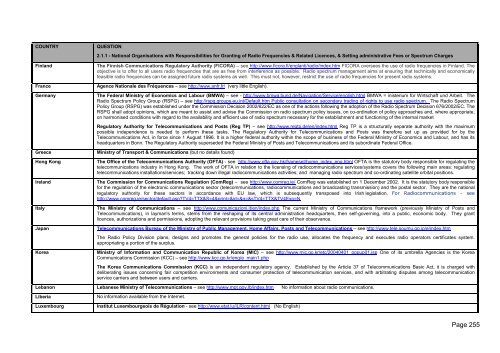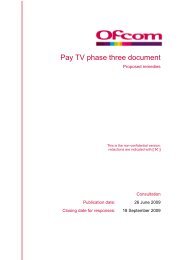FINAL REPORT - Stakeholders - Ofcom
FINAL REPORT - Stakeholders - Ofcom
FINAL REPORT - Stakeholders - Ofcom
Create successful ePaper yourself
Turn your PDF publications into a flip-book with our unique Google optimized e-Paper software.
COUNTRY<br />
QUESTION<br />
2.1.1 - National Organisations with Responsibilities for Granting of Radio Frequencies & Related Licences, & Setting administrative Fees or Spectrum Charges<br />
Finland The Finnish Communications Regulatory Authority (FICORA) – see http://www.ficora.fi/englanti/radio/index.htm FICORA oversees the use of radio frequencies in Finland. The<br />
objective is to offer to all users radio frequencies that are as free from interference as possible. Radio spectrum management aims at ensuring that technically and economically<br />
feasible radio frequencies can be assigned future radio systems as well. This must not, however, restrict the use of radio frequencies for present radio systems.<br />
France Agence Nationale des Fréquences – see http://www.anfr.fr/ (very little English).<br />
Germany The Federal Ministry of Economics and Labour (BMWA) – see - http://www.bmwa.bund.de/Navigation/Service/english.html BMWA = inisterium für Wirtschaft und Arbeit. The<br />
Radio Spectrum Policy Group (RSPG) – see http://rspg.groups.eu.int/Default.htm Public consultation on secondary trading of rights to use radio spectrum. The Radio Spectrum<br />
Policy Group (RSPG) was established under the Commission Decision 2002/622/EC as one of the actions following the adoption of the Radio Spectrum Decision 676/2002/EC. The<br />
RSPG shall adopt opinions, which are meant to assist and advise the Commission on radio spectrum policy issues, on co-ordination of policy approaches and, where appropriate,<br />
on harmonised conditions with regard to the availability and efficient use of radio spectrum necessary for the establishment and functioning of the internal market<br />
Regulatory Authority for Telecommunications and Posts (Reg TP) – see http://www.regtp.de/en/index.html Reg TP is a structurally separate authority with the maximum<br />
possible independence is needed to perform these tasks. The Regulatory Authority for Telecommunications and Posts was therefore set up as provided for by the<br />
Telecommunications Act, in force since 1 August 1996. It is a higher federal authority within the scope of business of the Federal Ministry of Economics and Labour, and has its<br />
headquarters in Bonn. The Regulatory Authority superseded the Federal Ministry of Posts and Telecommunications and its subordinate Federal Office.<br />
Greece Ministry of Transport & Communications (but no details found)<br />
Hong Kong The Office of the Telecommunications Authority (OFTA) - see http://www.ofta.gov.hk/frameset/home_index_eng.html OFTA is the statutory body responsible for regulating the<br />
telecommunications industry in Hong Kong. The work of OFTA in relation to the licensing of radiocommunications services/systems covers the following main areas: regulating<br />
telecommunications installations/services; tracking down illegal radiocommunications activities; and managing radio spectrum and co-ordinating satellite orbital positions.<br />
Ireland The Commission for Communications Regulation (ComReg) – see http://www.comreg.ie/ ComReg was established on 1 December 2002. It is the statutory body responsible<br />
for the regulation of the electronic communications sector (telecommunications, radiocommunications and broadcasting transmission) and the postal sector. They are the national<br />
regulatory authority for these sectors in accordance with EU law, which is subsequently transposed into Irish legislation. For Radiocommunications - see<br />
http://www.comreg.ie/sector/default.asp?TV4=TTX&S=4&print=&id=&q=&sTV4=TTX&TV4Exp=N<br />
Italy The Ministry of Communications – see http://www.comunicazioni.it/en/index.php The current Ministry of Communications framework (previously Ministry of Posts and<br />
Telecommunications), in layman's terms, stems from the reshaping of its central administration headquarters, then self-governing, into a public, economic body. They grant<br />
licences, authorizations and permissions, adopting the relevant provisions taking great care of their observance.<br />
Japan Telecommunications Bureau of the Ministry of Public Management, Home Affairs, Posts and Telecommunications – see http://www.tele.soumu.go.jp/e/index.htm<br />
The Radio Policy Division plans, designs and promotes the general policies for the radio use, allocates the frequency and executes radio operators certificates system.<br />
appropriating a portion of the surplus.<br />
Korea Ministry of Information and Communication Republic of Korea (MIC) – see http://www.mic.go.kr/etc/20040401_popup01.jsp One of its umbrella Agencies is the Korea<br />
Communications Commission (KCC) – see http://www.kcc.go.kr/eng/e_main1.php<br />
The Korea Communications Commission (KCC) is an independent regulatory agency. Established by the Article 37 of Telecommunications Basic Act, it is charged with<br />
deliberating issues concerning fair competition environments and consumer protection of telecommunication services, and with arbitrating disputes among telecommunication<br />
service carriers and between users and carriers.<br />
Lebanon Lebanese Ministry of Telecommunications – see http://www.mpt.gov.lb/index.htm No information about radio communications.<br />
Liberia No information available from the Internet.<br />
Luxembourg Institut Luxembourgeois de Régulation - see http://www.etat.lu/ILR/content.html (No English)<br />
Page 255
















